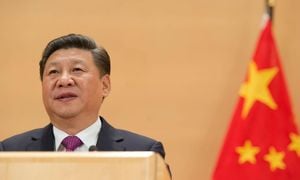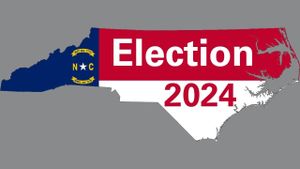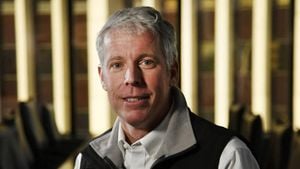President-elect Donald Trump’s nomination of Chris Wright, CEO of Liberty Energy, to serve as the Secretary of Energy is stirring significant controversy even before the confirmation process begins. Wright, who is known for his staunch advocacy of fracking and fossil fuels, is facing scrutiny not only due to his lack of traditional government experience but also because of his pronounced views on climate change and energy policy.
Wright’s selection has been touted as part of Trump’s broader ambition to increase U.S. energy independence, echoing campaign promises to lower gas prices and revitalize the American fossil fuel industry. "Chris has been a leading technologist and entrepreneur in Energy," Trump stated, crediting Wright with helping launch the American Shale Revolution. Trump believes Wright's expertise can spur a resurgence in oil and gas output. Yet, environmental advocates argue his nomination is indicative of Trump's administration returning to partnerships with the fossil fuel industry, criticized for its environmental impacts.
The immediate sticker price at the pump, currently averaging around $3.07 per gallon, was part of Trump's pitch at rallies. He has expressed ambitions to drop prices below $2 per gallon. This economic promise illuminates why appointing someone like Wright, who has direct ties to one of the nation's foremost fracking services companies, is seen as both strategic and opportunistic.
Many industry insiders expected such appointments to happen, as Wright's nomination aligns with the interests of key energy donors, particularly Harold Hamm, the billionaire oil magnate with strong ties to Trump. Hamm has been instrumental behind the scenes, championing Wright as the right choice, effectively making this nomination seem like another leg of the political money game, where campaign contributions influence government appointments and policy decisions.
Critics of Wright’s nomination highlight not only his advocacy for fossil fuels but his disregard for climate science. He famously claimed, “There is no climate crisis,” casting doubt on the necessity of transitioning away from hydrocarbons. This stance positions him directly against the narrative of many environmental and climate scientists who argue for urgent action to combat climate change and reduce reliance on fossil fuels.
Wright does have some support for renewable energy, as evidenced by his company’s investments in geothermal energy and sodium-ion battery technology, but his overarching commitment seems rooted firmly with traditional energy sources. This has led many to speculate whether his leadership at the Department of Energy will stifle initiatives aimed at advancing clean energy technologies.
During the nomination announcement, Trump also outlined Wright’s potential new role on the Council of National Energy alongside other industry-friendly appointments, including North Dakota Governor Doug Burgum, who is anticipated to push for expanded drilling on federal lands. Such moves have been widely interpreted as attempts to prioritize fossil fuel interests over environmental concerns.
Environmental groups have responded passionately to Wright’s nomination, emphasizing the broader implications for U.S. energy policy. They argue Wright's perspective threatens to undo progress made under the Biden administration toward cleaner energy alternatives. Hannah Ekin from the Arid Lands Environment Centre remarked, "This appointment highlights how powerful U.S. figures with deep connections to the Trump administration are driving fracking in the Northern Territory,” showcasing concerns about U.S. energy interests intersection with global environmental issues.
Internationally, the Beetaloo Basin project in Australia serves as another focal point of Wright's influence on fracking operations. Liberty Energy has partnered with Tamboran Resources to facilitate fracking operations, which some environmentalists believe will exacerbate water contamination risks and climate concerns. Ekin warned, “The opening up of the NT for fracking was never about Territorians – it’s always been about appeasing big American shale players.”
While some see Wright’s nomination as ushering back the pro-fossil fuel strategies of earlier Trump administrations, opponents maintain this path could deepen the existing divide on climate and energy policy within the U.S. and abroad. It’s evident Wright is expected to advocate for policies favoring increased production of oil and gas at the expense of environmental protections.
With the Senate confirmation process looming, the public discourse surrounding Wright’s nomination is likely to intensify. This nomination brings to the fore broader discussions about how the incoming administration will navigate the volatile waters of energy demands, environmental responsibilities, and the political ramifications of unyielding fossil fuel reliance, mirroring sentiments expressed during Trump's previous term.
Given Wright’s connections to significant energy donors and his positioning within the industry, his potential leadership style raises questions about balancing economic aspirations against pressing climate realities. If confirmed, the Energy Secretary might soon find himself at the crossroads of two contrasting factions — those advocating for economic growth through fossil fuels and those demanding immediate action on climate change.
Whether Wright will adhere to his promises of driving innovation or yield to the more traditional confines of fossil fuel loyalty will significantly shape America’s energy future. The scrutiny surrounding this appointment encapsulates the overarching tension between economic strategy and environmental responsibility, with each side vying for prominence as discussions of climate change become increasingly urgent.



